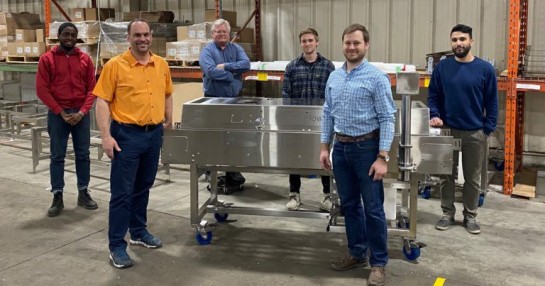Sir Isaac Newton discovered the law of gravity when a falling apple hit him on the head. Now, as the health-care industry scrambles, an enterprising fruit farmer has discovered a smart way to resolve the shortage of masks. Using technology built to protect consumers from fruit-borne listeria or other bacteria, food industry equipment can be repurposed to sterilize masks in 30 seconds, with tests showing that masks can be cleaned and recycled 50 times.
The U.S. Centers for Disease Control and Prevention reports that the bacteria E. coli 0157: H7 is responsible for 73,000 infections and 63 deaths every year. It produces a toxin that causes bloody diarrhea and abdominal pain, lasting two to three days, or longer for some people.
E. coli 0157: H7 is particularly dangerous for young children, the elderly and those with compromised immune systems. A rare occurrence is the Hemolytic Uremic Syndrome, which causes destruction of red blood cells and kidneys to fail. Some patients require kidney dialysis.
We all have E. coli in our bowel. Unfortunately, some very unfriendly cousins, such as E. coli 0157: H7, carry a chemical compound on their surface.
An infection of E. coli 0157: H7 often results from exposure to contaminated water and animal waste. This occurs when cattle manure enters streams close to farms. So, to protect yourself from infection, it’s prudent to wash fruit and vegetables. But this does not provide complete protection as the bacterium is sticky and can easily hide in leafy vegetables.
But Paul Moyer, co-founder of Clean Works in partnership with Court Holdings, is a member of the Moyer family that has been growing fruit in Niagara since 1799. He has recently developed equipment that quickly and safely decontaminates fruit and vegetables. The same technology is now being deployed to help resolve the global shortage of masks. It’s a wonderful example of ingenuity, and a reminder that some of the best solutions to health challenges may come from unexpected places.
Napoleon Bonaparte was once asked how he had won so many great battles. He replied, “I always concentrate all my cannons on one part of the enemy’s line.”
This is what Moyer has done with his new equipment. He decided to concentrate all his firepower — a combination of ultraviolet light, hydrogen peroxide, and ozone gas — in the fight against bacteria and viruses lurking on fruit and vegetables. This mixture resulted in a killing power 20 times more powerful than if each tactic had been used separately. Bacterial and viral intruders don’t stand a chance. The same proves true with masks. They emerge from the equipment after a brief 30-second exposure to this concentrated firepower, and they are ready for reuse. Doctors and nurses could immediately sterilize their own masks between patients, achieving optimal protection for them and their patients.
Like many discoveries, this venture did not happen overnight. Great ideas can come from anyone — and in this case, from a humble farmer. But taking this idea to market required collaboration from specialists in manufacturing and state-of-the-art formulations for killing pathogens without harming delicate products. Regulatory expertise was needed too.
Moyer partnered with a manufacturing company and sought out Professor Keith Warriner in the department of food science at the University of Guelph. Last year, for their work in protecting the public’s supply of fruits and vegetables, the Ontario Centres for Food Excellence awarded Moyer a top food safety award. Now, these partners are actively working with health authorities to place their equipment on the front line in the fight against COVID-19.
The timing could not be better when so many people are succumbing to infection. Once again, ingenuity is the gift of the apple tree. Both Newton and Napoleon would be proud of this Niagara farm boy!
Thanks to farmers everywhere for the good work they do.
Read original article at: https://www.niagarathisweek.com/opinion-story/9958974-sometimes-it-takes-an-apple-to-hit-you-on-the-head/

